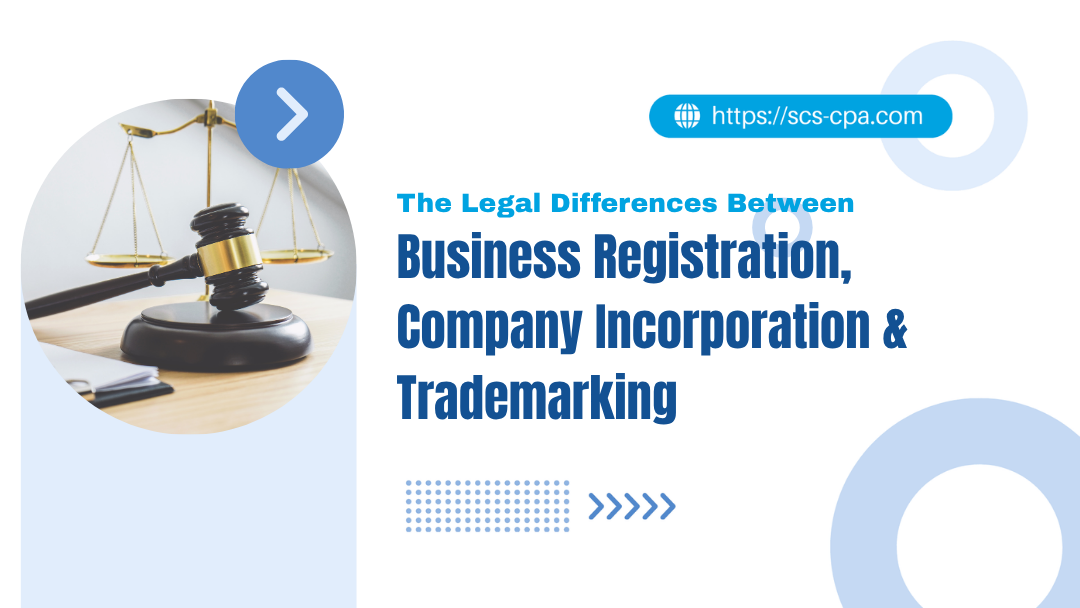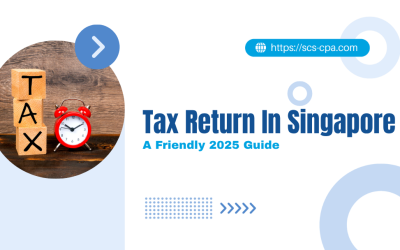
Starting a business in Singapore isn’t just a matter of registering a name or opening doors. The legal foundation you choose affects risk, taxes, brand protection, and long‑term viability. One of the first steps to take is to understand the differences between business registration, company incorporation and trademarking.
In this guide, you will learn what each of these three processes really means under Singapore law. We will cover how they differ from one another and which one to prioritise first when you set up your business.
What Each Process Means
|
Term |
Definition |
Purpose / When You’d Use It |
|
Business Registration |
Registering with ACRA via BizFile+ under a business name as a sole proprietor or partnership, not forming a separate legal entity. |
For sole practitioners, freelancers, or partnerships where business scale is small, risk exposure is low, and simplicity is prized.
Grants legality to operate, open bank accounts, get a UEN, etc. |
|
Company Registration / Incorporation |
Forming a Private Limited Company (Pte Ltd) under the Companies Act, the company becomes a separate legal entity distinct from its shareholders and directors. |
When you plan to scale, raise capital, hire employees, seek investor or bank trust, protect personal assets, or want perpetual business continuity. |
|
Trademark Registration |
Registering brand identifiers (name, logo, slogan) with IPOS to secure exclusive rights over their use in trade. |
When you have a brand identity important for marketing, online presence, or differentiation.
This registration prevents others from using similar branding; brand value matters. |
Detailed Legal and Practical Comparison

1. Legal Status and Entity Formation
Business Registration: In Singapore, sole proprietorships and general partnerships are not separate legal entities from their owners. This means you are personally liable for all business obligations and do not file separate accounts.
Company Incorporation: This process creates a distinct legal entity under the Singapore Companies Act. Through this process, companies can
- own properties,
- sue or be sued, and
- enter into contracts independently of their shareholders and directors.
Moreover, drawing a clear line ensures business continuity and facilitates ownership transfer through shares.
Trademark Registration: This process does not establish a legal entity but offers protection for intellectual property like brand names and logos. Upon completion, you will have exclusive rights to the holder without affecting business operations or ownership.
2. Liability Exposure
Business Registration:
Since the business is legally inseparable from its owner(s), liability is unlimited. The owner(s) are personally responsible for all debts, losses, and legal obligations incurred by the business. This means that creditors can pursue the owner’s personal assets if the business assets are insufficient. Among those assets are savings, property, or other holdings.
Company Incorporation:
Incorporated companies offer limited liability to shareholders, restricting their financial risk to their shares. Directors and shareholders are not personally liable for company debts unless misconduct or personal guarantees occur, while compliance with fiduciary duties is expected.
Trademark Registration:
Trademark registration has no bearing on liability, as it only protects the brand’s identity. It does not influence financial liabilities or legal responsibilities of the business.
3. Exposure of Personal Assets
Business Registration:
With unlimited liability, personal assets are at risk. If the business fails to pay its debts, creditors can go after the owner’s personal assets. This risk is a major concern for sole proprietorships and general partnerships.
Company Incorporation:
Shareholders and directors usually have their personal assets protected from company debts. However, this protection can be lost if directors act dishonestly, misbehave, or breach their duties. In these cases, courts can hold directors personally responsible.
Trademark Registration:
Trademark registration does not affect personal asset risk. It only relates to the rights to use brand elements in business, not to liability or asset protection.
4. Timeframes and Key Deadlines
Business Registration: Usually same-day or within 1 business day. If name reservation is involved, it’s valid for 120 days.
Company Incorporation: Typically takes 1–3 working days after name approval, provided all documents are complete. Missing or incorrect paperwork can delay the process.
Trademark Registration: Can take 6–12 months due to examination, publication, and opposition periods. The timeline depends on whether there are objections or complications.
5. Where and How to Register
Business Registration: You register your business via ACRA’s BizFile+ portal. During the process, you must provide your business name, owner details, and a registered address in Singapore.
Company Incorporation: This process is also done via BizFile+. You will need a company name, constitution, registered local address, director/shareholder info, and a resident director.
Trademark Registration: Done through the Intellectual Property Office of Singapore (IPOS). This registration requires classification of goods/services, payment of fees, and possible legal consultation.
You can find detailed guides for each type of registration in these articles:
- Overview of the Incorporation Process for Setting Up a Company in Singapore
- ACRA Business Registration: Tips, Pitfalls And Paperwork
- Trademark Registration for Businesses in Singapore
6. Required Documents and Fees
Business Registration:
- Documents: Name, owner details, registered address.
- Fees: Typically SGD 100–160 depending on entity type.
Company Incorporation:
- Documents: Constitution, shareholder/director details, name reservation.
- Fees: SGD 15 for name + SGD 315 for incorporation (or more depending on share capital).
Trademark Registration:
- Documents: Description of mark and classes of goods/services.
- Fees: From SGD 280 per class (online). Additional fees apply for complex filings.

7. Ongoing Compliance Obligations
Business Registration:
Sole proprietorships and partnerships must renew their registration annually with ACRA. You can do so up to 60 days before expiry via the BizFile+ portal.
Company Registration: Companies face stricter regulations, including filing annual returns with ACRA and appointing a company secretary within six months. Annual General Meetings (AGMs) are typically required, with some exemptions for smaller firms.
Moreover, companies must maintain updated records of shareholders and financial statements. These records may need to be filed or kept for inspection.
Trademark Registration: Registered trademarks in Singapore last ten years and require renewal to maintain protection. Trademark owners must actively use their marks to avoid cancellation for non-use. You are also responsible for monitoring infringements through the Intellectual Property Office of Singapore (IPOS).
8. Tax Treatment
Business Registration:
In Singapore, businesses registered as sole proprietorships or partnerships are not taxed separately from their owners. Instead, business profits are treated as personal income for the owner(s) and taxed accordingly under the individual income tax rates.
These rates are progressive, with the top marginal tax rate being 22%. Moreover, all profits from the business are combined with other personal income and taxed at rates applicable to individuals.
Company Registration:
Private Limited Companies (Pte Ltd) in Singapore are distinct legal entities for tax purposes. They are subjected to a corporate income tax rate of 17% on chargeable income. Meanwhile, startups and SMEs benefit from the Startup Tax Exemption (SUTE) Scheme. It offers a 75% exemption on the first SGD 100,000 and a 50% exemption on the next SGD 100,000 for the first three years.
For non-startups, the Partial Tax Exemption (PTE) provides a 75% exemption on the first SGD 10,000 and a 50% exemption on the next SGD 190,000. Moreover, a 50% Corporate Income Tax rebate *(capped at SGD 40,000) for the Year of Assessment 2025 is available.
*Subject to eligibility criteria.
Tip: Companies can also benefit from deductible business expenses, allowing separation of corporate and personal income.
Trademark Registration:
There is no tax directly associated with registering a trademark in Singapore. However, the trademark may be recognised as an intangible asset contributing to the company’s valuation. If the trademark generates royalty income or licensing revenue, such income is subject to tax as part of the business revenue of the owner or company receiving it. Additionally, companies may benefit from tax deductions related to costs incurred in registering intellectual property, including trademarks.
9. Perpetual Succession
Business Registration:
Sole proprietorships and partnerships are legally tied to the owner(s). This means that they cease to exist when the owner dies, retires, or closes the business. To continue, they must be re-registered or transferred.
Company Incorporation: Private Limited Companies in Singapore endure indefinitely, separate from their shareholders or directors. Ownership can change through share transfers, but the company remains the same legal entity. The shared legal entity ensures stable contracts and investor trust.
Trademark Registration: Trademark rights can last indefinitely by renewing every ten years and continuing use. Trademarks can be transferred or licensed without impacting business registration or company structure, allowing continuity despite ownership changes.
10. Penalties & Risks
Business Registration:
Operating without proper registration or failing to update details with ACRA can incur penalties and potential prosecution. These fines can go up to SGD 10,000. If you do not renew on time, you may also face additional fees and business registration removal.
Company Incorporation:
The Corporate Service Providers Act 2024 imposes heavy penalties. Among them are fines up to SGD 100,000 for breaching money laundering compliance.
Non-compliance with corporate regulations can result in fines between SGD 300 and SGD 50,000. Additionally, serious violations, such as falsifying documents, may lead to prosecution or imprisonment.
Trademark Registration:
A trademark not used commercially for three years may be cancelled. If you do not monitor your rights closely, you may risk losing your rights if third parties successfully challenge the mark. Moreover, giving false information during trademark application or renewal processes can result in rejection or cancellation of registration.
Which Comes First: Business Registration, Company Incorporation, or Trademark Registration?

Business registration or company incorporation must occur before commencing legal operations. Sole proprietorships and partnerships require registration with ACRA, while Private Limited Companies and other entities need incorporation. This process establishes legal existence for activities like banking and hiring.
Trademark registration follows after your business registration and company incorporation. It protects your brand identity through the Intellectual Property Office of Singapore (IPOS). Yet, this process safeguards your business from unauthorised use and does not provide legal business status.
If you are unsure or unfamiliar with the process, you can consult professionals like Singapore Corporate Services. They provide end-to-end support and guidance to ensure you correctly complete each step.
Disclaimer: The information provided in this article is intended for general guidance only and reflects regulations as of the publication date. Given that compliance requirements, processes, and fees may change over time, readers are advised to consult official sources such as ACRA for the most up-to-date information or seek professional guidance from our team.
Have A Question?
Connect with us to better understand
company registration, incorporation and
trademarking in Singapore.
Corporate Income Tax Malaysia: Rates, Filing, and Strategic Compliance
Understand Malaysia’s corporate income tax system. Learn current tax rates, SME tiers, filing deadlines, LHDN requirements, penalties, and more.
Understanding the Core Types of Audits and Their Roles in Accounting in Singapore
Learn the key types of audits in Singapore to build trust and stay compliant. Examples are statutory, internal, GST, and forensic.
Tax Return In Singapore: A Friendly 2025 Guide
Want to be a responsible business owner? Read this guide to tax return in Singapore to help understand tax filing and play your part.



